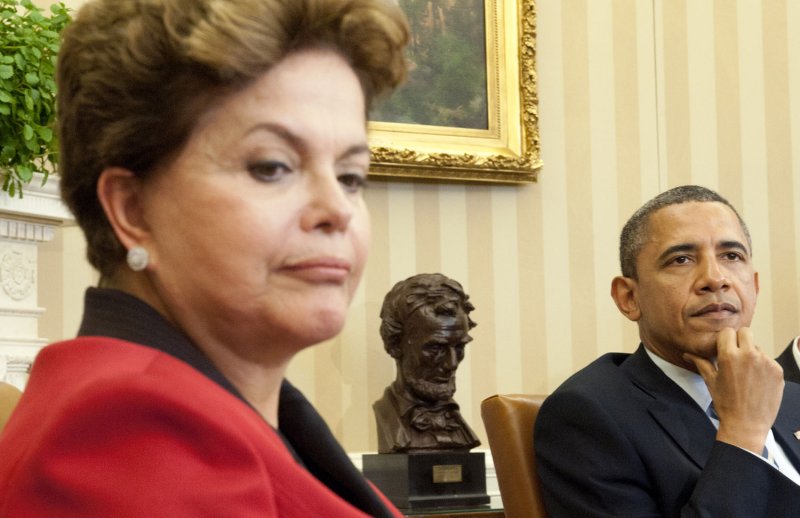U.S. President Barack Obama meets with Brazilian President Dilma Rousseff in the Oval Office of the White House in Washington on April 9, 2012. UPI/Kevin Dietsch |
License Photo
RIO DE JANEIRO, July 25 (UPI) -- Brazilian President Dilma Rousseff has seen a dip in approval ratings blamed by opponents on wasteful state spending and by business on trade policies.
The Brazilian Foreign Trade Association has warned the South America nation's balance of trade would go into deficit for the first time since 2000 and the deficit could reach $2 billion.
Rousseff supporters say many of the factors stacked up against the president are seasonal and not her fault. Still, the incumbent's crumbling popularity has led to an unlikely spectacle of Brazilians calling for a return of popular former President Luiz Inacio Lula da Silva.
Lula da Silva's rise was fueled by a commodities boom before he handed over power to Rousseff in 2010 and he has faced tough scrutiny after a series of corruption scandals involving politicians. Despite those considerations, recent polls showed Rousseff supporters shifting loyalties to Lula da Silva before the 2014 elections.
Brazil's average growth has hit the slowest rate in 24 years and there's little indication it can improve any time soon.
In an unprecedented show of public fury, the once popular Rousseff faced boos and angry protests at her appearances at recent events. Critics and protesters fault the government for organizational failures during the visit of Pope Francis.
Rousseff has come under fire for not doing enough to clean up slums, reduce poverty and control recent rises in cost of living, including food and public transport. Protests have paralyzed parts of Rio de Janeiro and other major cities for more than a month, further affecting economic activity.
Opinion polls showed Rousseff trailing behind Lula da Silva as the most favored candidate for the ruling Workers Party in next year's presidential election. So far Lula da Silva has backed Rousseff as his candidate and declared he has no intention of bidding for the presidency next year.
Despite the political upheavals the ruling Workers Party is favored to lead the polls but discontent within its ranks threatens to drive a wedge and push voters toward other contenders.
Much of the disapproval for Rousseff stems from the government's allegedly lavish spending in preparation for the 2014 FiFA World Cup and the 2016 Olympics. Critics say not enough is being done to lift millions of Brazilians out of poverty.
There's also frequent criticism that infrastructure spending is uneven and will not prepare the country for the expected rush of visitors during the two events between 2014 and 2016.
Trade figures have worsened.
The Foreign Trade Association data showed a 5 percent drop in Brazil's exports to $230.5 billion and a 4.2 percent rise in imports to $232. billion. The association, known by its Brazilian Portuguese acronym AEB, is a non-profit organization representing companies that export and import goods and services.
Analysts said some of the differences in figures could be due to recent weakening in the prices of commodities including oil and raw materials.





